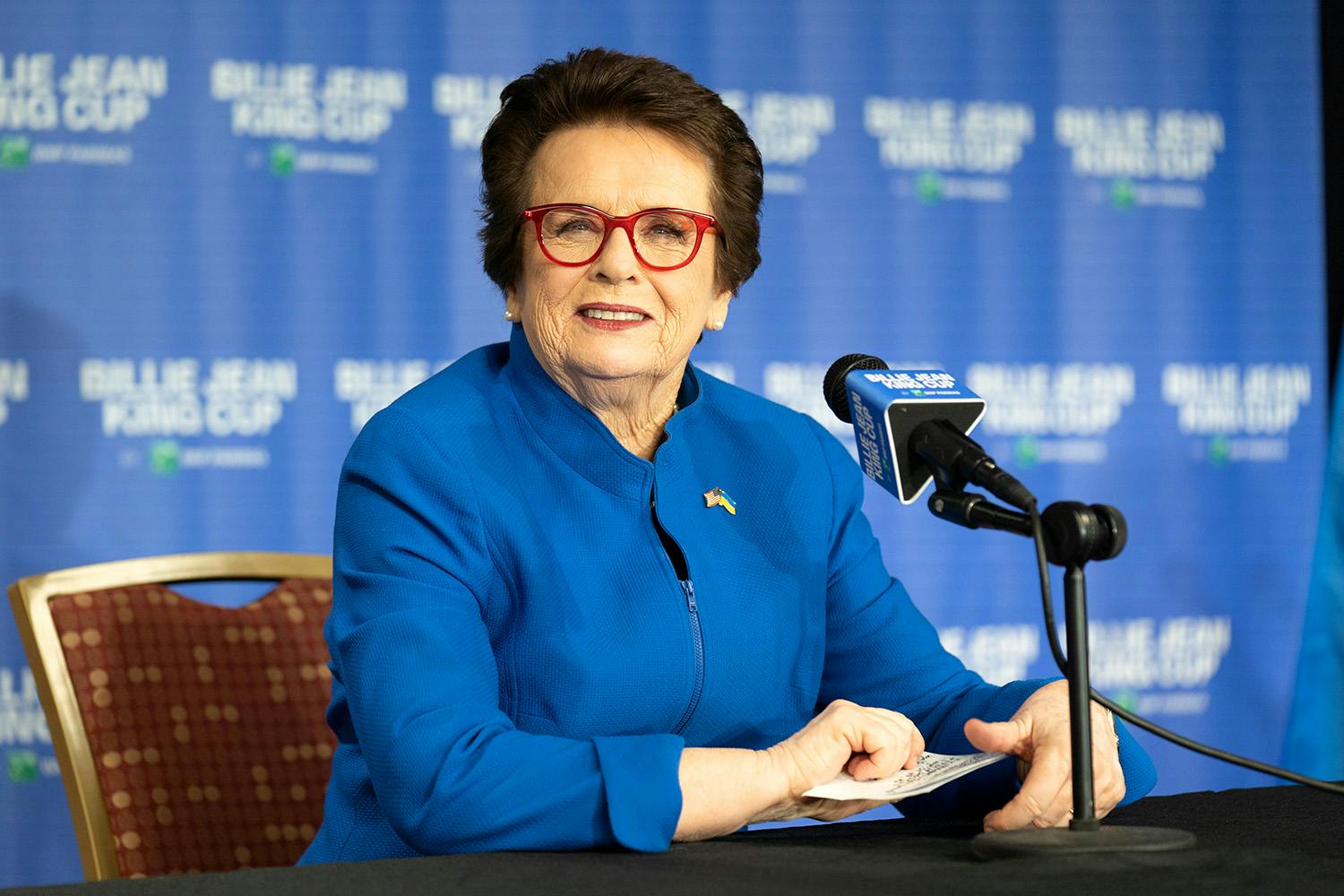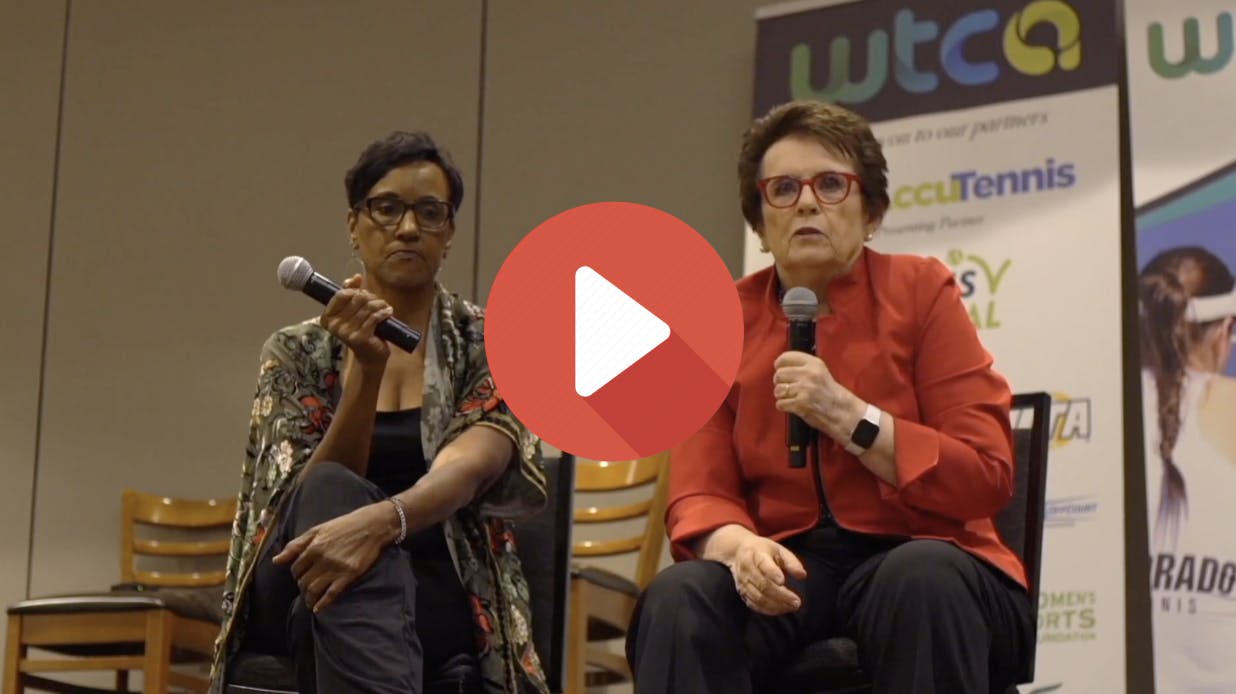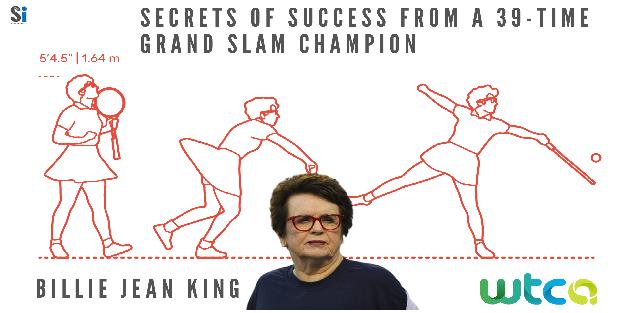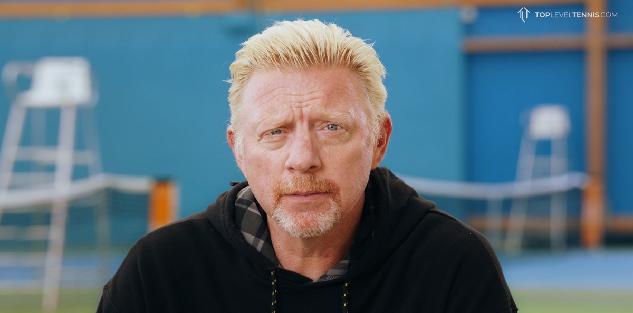Featured courses
- Four Tips to Turn Your Tennis Forehand Into a Weapon by Grant Young
- Tennis Legend Billie Jean King’s 4 Responsibilities as a Player by Grant Young
- Two Top Priorities For Success in Doubles Tennis by Grant Young
- Three of Tennis Whiz Lisa Dodson’s Tips to Improve Serves by Grant Young
- Three Elite Tennis Ball Machine Drills by Grant Young
- Three Keys For Correcting Tennis Serving Mechanics by Grant Young
- Five Tactical Tips to Win More Tennis Matches by Grant Young
- 4 Lessons Patrick Mouratoglou Learned From Coaching Serena Williams by Grant Young
- Four Effective Backhand Tennis Drills by Grant Young
- Two of Legendary Tennis Coach Paul Annacone’s Crucial Player Development Tips by Grant Young
- A Step-By-Step Guide To Mastering The Serve by Krsto Arsenijevic
- How to Dominate the Clay Court in Tennis by Krsto Arsenijevic
- 10 Essential Tennis Drills Every Coach Should Know by Brandon Ogle
- 8 Pre-Game Exercises to Prime Your Tennis Team for Competition by Neil Brown
- 7 Proven Tips To Develop Your Net Game in Tennis by Krsto Arsenijevic
- 10 Essential Tennis Drills Every Coach Should Know by Krsto Arsenijevic
- Developing Players - Two-handed backhand by Ramon Osa
- 6 Simple Warm-up Exercises For Tennis Players by Krsto Arsenijevic
- How to Beat a Serve-and-Volley Player by Krsto Arsenijevic
- How To Build Your Kinetic Chain Like Djokovic by Aiden Lefebvre
- How to neutralize a lefty in Tennis by Aiden Lefebvre
- 5 Tips To Improve Your Tennis Game Today by Krsto Arsenijevic
- Everything You Need to Know Before Buying New Tennis Shoes by Brandon Ogle
- Amp up your tennis practice with situational play by Neil Brown
- Tennis Equipment List by Brandon Ogle
- How to Master The One-handed Backhand in Tennis by Krsto Arsenijevic
- Modern High School Tennis Coaching Obstacles by Neil Brown
- Increase Your Tennis Fitness Level With 3 Easy Drills by Krsto Arsenijevic
- How to Successfully Hit a Two-Handed Backhand by Brandon Ogle
- How to Become a Grass Court Specialist in Tennis by Brandon Ogle
- How to Dominate the Hard-Court like Serena Williams by Brandon Ogle
- Hit a Drop Shot to Keep Your Opponent Off-Balance by Brandon Ogle
- New Tennis Injury Findings Linked to Neutral & Closed Stances by Oscar Wegner
- CHATTING WITH TENNIS PRO BRUCE CONNORS by Brandon
- How to Become a Mentally Strong Tennis Player by Brandon Ogle
- How to Win the Game of Angles by Hitting Cross-Court Shots by Eric Mahnke

Tennis Legend Billie Jean King’s 4 Responsibilities as a Player
- By Grant Young
If there is anybody you should be eager to glean tennis coaching wisdom from, it’s Billie Jean King.
A legendary figure in the world of tennis, King has not only made remarkable contributions to the sport through her incredible achievements on the court, but she has also played a vital role in advocating for equality and social justice.
Over her illustrious career, King won 39 Grand Slam titles, including 20 singles championships, making her one of the most successful players in tennis history. King’s pivotal moment came in 1973 when she defeated Bobby Riggs in the famous "Battle of the Sexes," solidifying her role as an advocate for women's rights in sports.
Beyond her playing success, King transitioned to coaching and mentoring, emphasizing the importance of mental toughness and confidence in athletes. She founded the Women’s Tennis Association (WTA) and played a significant role in establishing equal prize money for women in tennis tournaments. King's legacy extends beyond tennis; she remains a staunch advocate for social justice, inspiring generations of athletes to fight for equality on and off the court.
King continues to make an impact as a tennis coach, with her wisdom often focusing on how tennis players can improve their mental strength, which directly translates into how they perform on the court.
In her ‘Billie Jean King - Secrets of Success from a 39-Time Grand Slam Champion’ clinic, King shares practical training secrets along with some of the key traits that separate champions from "good" or "great" players. We have pulled some of her most compelling lessons — along with her ‘4 Responsibilities as a Player’ — to share with you below.
4 Responsibilities as a Player
Former tennis player Leslie Allen (who joined the WTA Tour in 1977 and went on to reach a career-high ranking of No. 17 in the world in February 1981) was alongside King during the clinic, and shared a story about King telling her about the four responsibilities a tennis player has while they were on Tour together. They were as follows:
1. Putting the best product out there [on the court]
2. Make sure you take care of the fans.
3. Make sure you take care of the sponsors.
4. Make sure you take care of the public.
While this makes a lot of sense for professional tennis players, it might seem like this is useless information for young and amateur players. However, we would argue that it’s just as valuable information if those words are broadened.
The first responsibility speaks for itself, and it is always sometimes tennis players (and all athletes, for that matter) should be striving for.
However, the second responsibility will be much different, considering that youth tennis players aren’t going to be having stadiums full of fans pining to watch them play. But young tennis players can take this to mean that they must be respectful of those who are fellow fans of the game.
In this respect, taking care of the game can mean showing respect for the sport of tennis and playing it the right way, with dignity and integrity. This is something all tennis players can feel responsible for, regardless of their level.
The third responsibility about sponsors is extremely valuable for amateur and youth players because it can mean being respectful and thankful toward parents and coaches, who are investing time money, and effort toward their tennis careers. These “sponsors” certainly deserve a ton of respect and gratitude, which is a responsibility all tennis players should uphold.
And the fourth responsibility can be toward fellow players and competitors, as they’re out of a player’s control and can be considered part of the public.
This is how Billie Jean King’s 4 responsibilities as a player can be translated into powerful messages for youth and amateur tennis players.
Helping Kids Be Champions in Life

At another point in the clinic, King discusses some of the things her parents and coaches did when she was a young player that increased her enthusiasm and passion for the sport rather than hindered it.
She said that one of the most valuable things her parents (who rarely watched her play in person) ever did for her was to never ask whether she won or lost games when she returned home. Instead, they would ask her how her day was, and allow her to guide the conversation toward outcomes if she desired.
This can also be a valuable lesson for coaches. Rather than focusing solely on a player’s outcome or results during the match (whether they won or lost), the coach can focus on the specific things that a player did well or could use improvement on in terms of their actual performance.
In other words, no player is ever going to play a perfect match, and no player is going to swing and miss at every single shot. So a coach finding something for a player to build on and to work on after every match can help separate emotion from outcome, and get a player to focus on their overall development rather than their win-loss record.
It’s lessons like these that taught King to love the game of tennis, which turned her into one of the greatest players the sport has ever seen. While it will be difficult for players to reach that same level, that doesn’t mean these same lessons can be used to produce beneficial careers for young athletes, both on and off the court.



